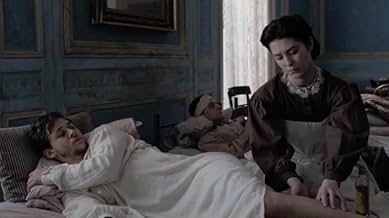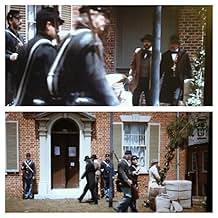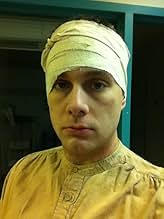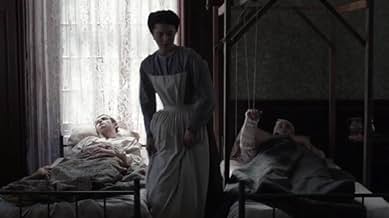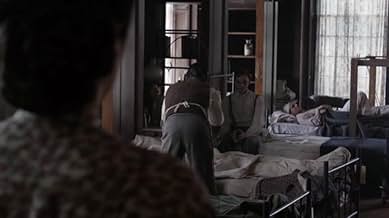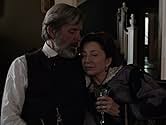ÉVALUATION IMDb
7,5/10
3,1 k
MA NOTE
La vie de deux infirmières volontaires dans les camps opposés de la Guerre de Sécession - l'abolitionniste de Nouvelle Angleterre, Mary Phinney, et la partisane des Confédérés, Emma Green.La vie de deux infirmières volontaires dans les camps opposés de la Guerre de Sécession - l'abolitionniste de Nouvelle Angleterre, Mary Phinney, et la partisane des Confédérés, Emma Green.La vie de deux infirmières volontaires dans les camps opposés de la Guerre de Sécession - l'abolitionniste de Nouvelle Angleterre, Mary Phinney, et la partisane des Confédérés, Emma Green.
- Prix
- 1 victoire au total
Parcourir les épisodes
Avis en vedette
I am greatly enjoying this series. The production has the feel of the period from the mud in the streets, to the period decor of the rooms and costumes, all the way to the amputated limbs being taken away in a wheelbarrow. War is hell, and none was more so than the Civil War, when weaponry had become so efficient as to mow down regiments marching forward in outdated styles of battle. Some viewers might object to bloody surgery scenes. However, one of the most affecting scenes to me was of a Confederate soldier with shell shock who told of the horror of battle, "the smoke and blood and the screaming, you never know where it's coming from."
Soldiers who make it to this hospital are cared for to the best of their abilities by Mary Phinney and Dr. Jedediah Foster, played admirably by Mary Elizabeth Winstead and Josh Radnor. Their own personal dramas are interwoven into the story lines quite well. Applause to the producers and directors!
Soldiers who make it to this hospital are cared for to the best of their abilities by Mary Phinney and Dr. Jedediah Foster, played admirably by Mary Elizabeth Winstead and Josh Radnor. Their own personal dramas are interwoven into the story lines quite well. Applause to the producers and directors!
I had high hopes for Mercy Street. Fictionalized history has become increasingly popular in recent years, and this show had potential to be one of the more memorable ones, with a previously untapped setting and a cast full of talented actors. Sadly, the show has turned out to be mostly unremarkable.
The basic premise is simple: a widowed woman is sent to become head nurse at a military hospital converted from a hotel in Union-occupied Alexandria, Virginia. On top of this premise, the show's writers have piled enough dramatic crises and neurotic characters to populate a full soap opera. Everyone is constantly shouting at each other and plotting behind each other's backs.
Given the setting, conflict and friction is understandable, and of course a drama needs, well, drama. But with only six episodes, they've created enough plot lines to easily fill a US-standard 22-episode season, if not more. Everything is just so busy that the only way we learn anything about the characters is through their conflicts. Calm moments are few and far between. Most performances border on scenery- chewing, except of course when they jump well past that border.
That said, there are a number of things to enjoy. Mary Elizabeth Winstead, always a treat, seems so comfortable with the trappings of the period you'd think she was born into it. Donna Murphy is exquisite as the quintessential Southern matriarch, turning borderline overacting into a virtue. Tara Summers has channeled all the snarky disdain of Alan Rickman while Jack Falahee is the spitting image in looks and charm of a young Johnny Depp. Gary Cole, one of the few cast members not constantly gnaw at the walls, adds just enough temper to his usual near-deadpan dryness to be a realistic Southern businessman trying to hold onto what little he has left after the Union takes everything.
The real surprise, though, is Josh Radnor. If you've only seen him in How I Met Your Mother, you'd have no idea that he's capable of the quietly powerful performance he turns in here. Yes, he does spend a lot of time chomping on the set, but he balances that with more subtle moments that reveal significant talent he hasn't had much opportunity to utilize. In many ways, he reminds me of Mandy Patinkin in his younger days.
Ultimately, the show is entertaining enough to be worth watching if you like fictionalized history. Just don't expect more from it than it is.
The basic premise is simple: a widowed woman is sent to become head nurse at a military hospital converted from a hotel in Union-occupied Alexandria, Virginia. On top of this premise, the show's writers have piled enough dramatic crises and neurotic characters to populate a full soap opera. Everyone is constantly shouting at each other and plotting behind each other's backs.
Given the setting, conflict and friction is understandable, and of course a drama needs, well, drama. But with only six episodes, they've created enough plot lines to easily fill a US-standard 22-episode season, if not more. Everything is just so busy that the only way we learn anything about the characters is through their conflicts. Calm moments are few and far between. Most performances border on scenery- chewing, except of course when they jump well past that border.
That said, there are a number of things to enjoy. Mary Elizabeth Winstead, always a treat, seems so comfortable with the trappings of the period you'd think she was born into it. Donna Murphy is exquisite as the quintessential Southern matriarch, turning borderline overacting into a virtue. Tara Summers has channeled all the snarky disdain of Alan Rickman while Jack Falahee is the spitting image in looks and charm of a young Johnny Depp. Gary Cole, one of the few cast members not constantly gnaw at the walls, adds just enough temper to his usual near-deadpan dryness to be a realistic Southern businessman trying to hold onto what little he has left after the Union takes everything.
The real surprise, though, is Josh Radnor. If you've only seen him in How I Met Your Mother, you'd have no idea that he's capable of the quietly powerful performance he turns in here. Yes, he does spend a lot of time chomping on the set, but he balances that with more subtle moments that reveal significant talent he hasn't had much opportunity to utilize. In many ways, he reminds me of Mandy Patinkin in his younger days.
Ultimately, the show is entertaining enough to be worth watching if you like fictionalized history. Just don't expect more from it than it is.
I'm not sure why any viewer would compare a series set during American revolutionary times (the Civil War) to Downton Abbey. Downton Abbey was simply a remake of the popular (and recently remade) series, Upstairs, Downstairs. It was mostly an entertaining soap about a rich family and their household, but I digress...
First off, all of the actors are well-cast and do suitably good work. It's only been two episodes, so we'll have to wait and see as far as whether any heavy lifting will be required, acting wise. It's safe to say that we should expect to see the transformation of some of the characters, insofar as their beliefs are portrayed. There is a doctor, for example, who has no problem with slavery, but believes that it is his duty to equally treat Union and Confederate soldiers because, "Blood does not run grey or blue, it runs red." The nurse to whom he makes this argument (Nurse Mary/Baroness), is a staunch supporter of the Union and believes that as a Union hospital, Union soldiers can claim priority.
We have familiar faces in this cast - L. Scott Caldwell, Donna Murphy, Gary Cole, Tara Summers, and new ones in Shalita Grant, McKinley Belcher III, and Mary Elizabeth Winstead. While Mercy Street bears some similarity to The Knick due to its setting (a hospital) and a promise of change to come, it is less graphic in its portrayal of the everyday occurrences of the medical world.
With the popularity of Hamilton on today's Broadway stage, Mercy Street is a welcome addition to the TV lineup, as anything that encourages today's American to learn about the past is a boon, indeed.
First off, all of the actors are well-cast and do suitably good work. It's only been two episodes, so we'll have to wait and see as far as whether any heavy lifting will be required, acting wise. It's safe to say that we should expect to see the transformation of some of the characters, insofar as their beliefs are portrayed. There is a doctor, for example, who has no problem with slavery, but believes that it is his duty to equally treat Union and Confederate soldiers because, "Blood does not run grey or blue, it runs red." The nurse to whom he makes this argument (Nurse Mary/Baroness), is a staunch supporter of the Union and believes that as a Union hospital, Union soldiers can claim priority.
We have familiar faces in this cast - L. Scott Caldwell, Donna Murphy, Gary Cole, Tara Summers, and new ones in Shalita Grant, McKinley Belcher III, and Mary Elizabeth Winstead. While Mercy Street bears some similarity to The Knick due to its setting (a hospital) and a promise of change to come, it is less graphic in its portrayal of the everyday occurrences of the medical world.
With the popularity of Hamilton on today's Broadway stage, Mercy Street is a welcome addition to the TV lineup, as anything that encourages today's American to learn about the past is a boon, indeed.
This series began with real promise - an American period drama along the lines and quality of what Masterpiece has imported from across the pond. And for the most part, the first season delivered.
But the second season devolved into a Grey's Anatomy-style soap (complete with the annoying underscore) that treated the horrors and suffering of the Civil War as a backdrop for quirky characters and their high jinks. The psychological drama never reached deeper than a wading pool.
The real mercy in Mercy Street was putting it out of its misery at the end of the second season.
But the second season devolved into a Grey's Anatomy-style soap (complete with the annoying underscore) that treated the horrors and suffering of the Civil War as a backdrop for quirky characters and their high jinks. The psychological drama never reached deeper than a wading pool.
The real mercy in Mercy Street was putting it out of its misery at the end of the second season.
I'm hopeful that this series marks a start to some quality original PBS programming rather than more transatlantic imports from the BBC or ITV. So far so good. I'm curious about some of the message board complaints about the gory nature of the surgery scenes. I would rather see the good, the bad, and the ugly instead of a watered down, whitewashed, and sanitized presentation. I like my stories with some real grit. The characters have some real depth. I don't like put-on southern accents. Like fake snow it diminishes the realism of the scene. And this series has lots of that. But (at least so far) the people of color have more to do in this story than serve angry white people. The Civil War is a dramatic season in our nation's history. It's not always a pretty story. But as a backdrop for this drama it is told with some dignity and respect for all the players, regardless of their uniform. I think we could use more of that attitude today.
Le saviez-vous
- AnecdotesThe real Alice Green actually died a few weeks short of her 15th birthday in early 1860, over a year before the start of the Civil War.
Meilleurs choix
Connectez-vous pour évaluer et surveiller les recommandations personnalisées
- How many seasons does Mercy Street have?Propulsé par Alexa
Détails
- Date de sortie
- Pays d’origine
- Sites officiels
- Langue
- Aussi connu sous le nom de
- Улица милосердия
- Lieux de tournage
- Laburnum House - 1300 Westwood Avenue, Richmond, Virginie, États-Unis(Mansion House Hotel)
- sociétés de production
- Consultez plus de crédits d'entreprise sur IMDbPro
Contribuer à cette page
Suggérer une modification ou ajouter du contenu manquant

Lacune principale
By what name was Mercy Street (2016) officially released in India in English?
Répondre



